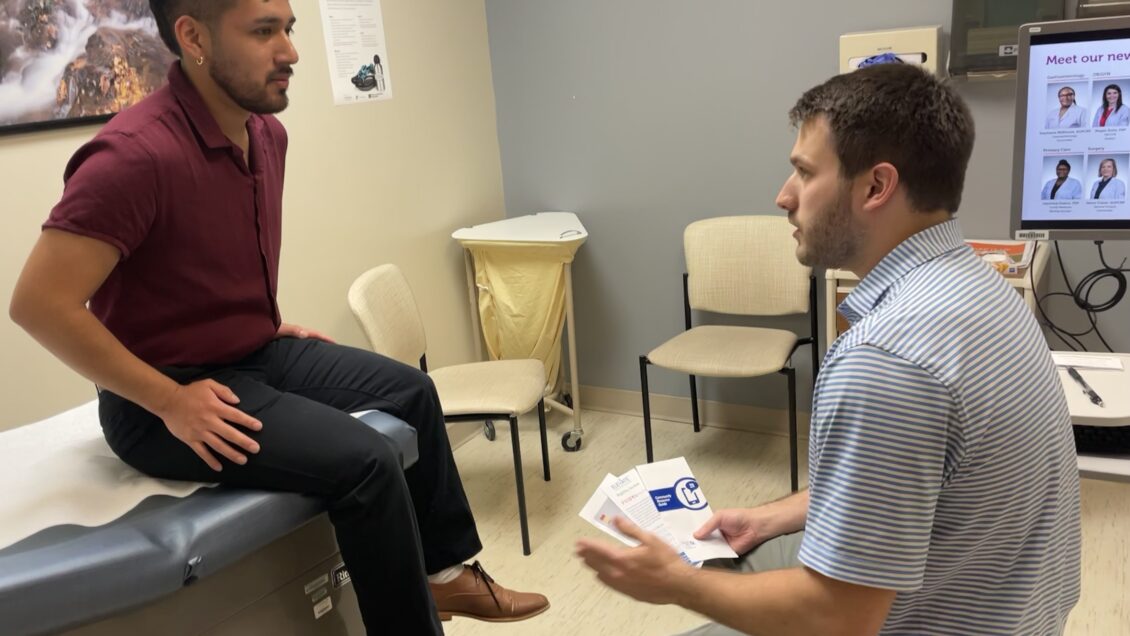When someone with alcohol use disorder is hospitalized, the recovery process is usually addressed with a pamphlet and referral to a treatment center at the patient’s discharge. It is left up to the patient to seek additional treatment after medical attention.
Thanks to a pilot project, Kaileigh Byrne, health researcher and associate professor of cognitive psychology in the College of Behavioral, Social and Health Sciences (CBSHS), has the research to show that recovery is more successful when patients start the process while they are hospitalized.
Byrne was recently awarded $3.2 million from the National Institutes of Health (NIH) to enhance and expand this project to help people hospitalized with alcohol use disorder make a full recovery.
The program, RC-Link involves a bedside introduction to a peer recovery coach during the patient’s hospitalization, as well as continued recovery support for six months. Based on the pilot project, when patients were linked with a peer mentor during hospitalization, the patients did not consume as much alcohol, were more engaged in treatment and had fewer emergency room visits.
According to the Centers for Disease Control and Prevention’s (CDC) National Hospital Ambulatory Medical Care Survey, alcohol use disorder accounts for more than 10 percent of hospital admissions in the United States. Patients hospitalized with alcohol-related medical complications tend to be at higher risk for recurrence of alcohol-related medical problems, high rates of hospital readmissions and poor recovery outcomes.
The project, which was started in 2018 in an Upstate South Carolina hospital with funding from the Health Sciences Center at Prisma Health, included patients with any type of substance use disorder, and results showed the peer-recovery coaching program was more beneficial to individuals with alcohol use disorder.
Byrne is hopeful this new program developed from the pilot project will be able to help decrease emergency room visits and hospitalizations due to alcohol use.
“Recovery is rarely a linear process. It is rare for individuals with alcohol use disorder to go cold turkey and remain sober indefinitely. Instead, recovery is typically characterized by a steady reduction in alcohol consumption over time,” Byrne said. “The RC-Link program advocates for patients to customize their recovery journey around their unique goals, values and needs, rather than promoting an ‘one-size-fits-all’ approach.”
Peer recovery coaches are individuals who have successfully achieved recovery from alcohol use disorder; they provide direct socioemotional support to patients and help link them to resources they may need to facilitate their recovery, such as assistance with rehabilitation programs, stable housing and tips for coping with cravings and triggers. The goal of this program is to provide a direct link to recovery support care while patients are hospitalized so that they have a knowledgeable, supportive person to lean on and guide them through their recovery.
As part of this study, Byrne’s team will compare recovery, health and cost-effectiveness outcomes of individuals participating in the RC-Link program to a control group that receives the standard of care, which is a pamphlet and a referral to a treatment center.
The NIH-funded project will last for five years and include Clemson Department of Psychology assistant professor Irene Pericot-Valverde, Department of Public Health Sciences professor Moonseong Heo, CBSHS Institute for Engaged Aging director Lesley Ross, psychology professor of practice Alain Litwin, MD, and executive director of the Addiction Medicine Center at Prisma Health. The project is located at both Prisma Health’s Greenville Memorial and Oconee Memorial hospitals.


Research reported in this press release was supported by the NIAAA of the National Institutes of Health under award number R01AA030815.
The Department of Psychology and Department of Public Health Sciences are part of the University’s College of Behavioral, Social and Health Sciences (CBSHS). Established in July 2016, CBSHS is a 21st-century, land-grant college that combines work in seven disciplines – communication; nursing; parks, recreation and tourism management; political science; psychology; public health sciences; sociology, anthropology and criminal justice – to further its mission of “building people and communities” in South Carolina and beyond.
Get in touch and we will connect you with the author or another expert.
Or email us at news@clemson.edu

